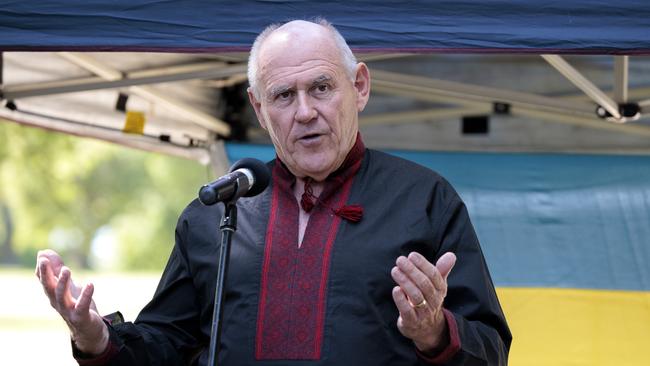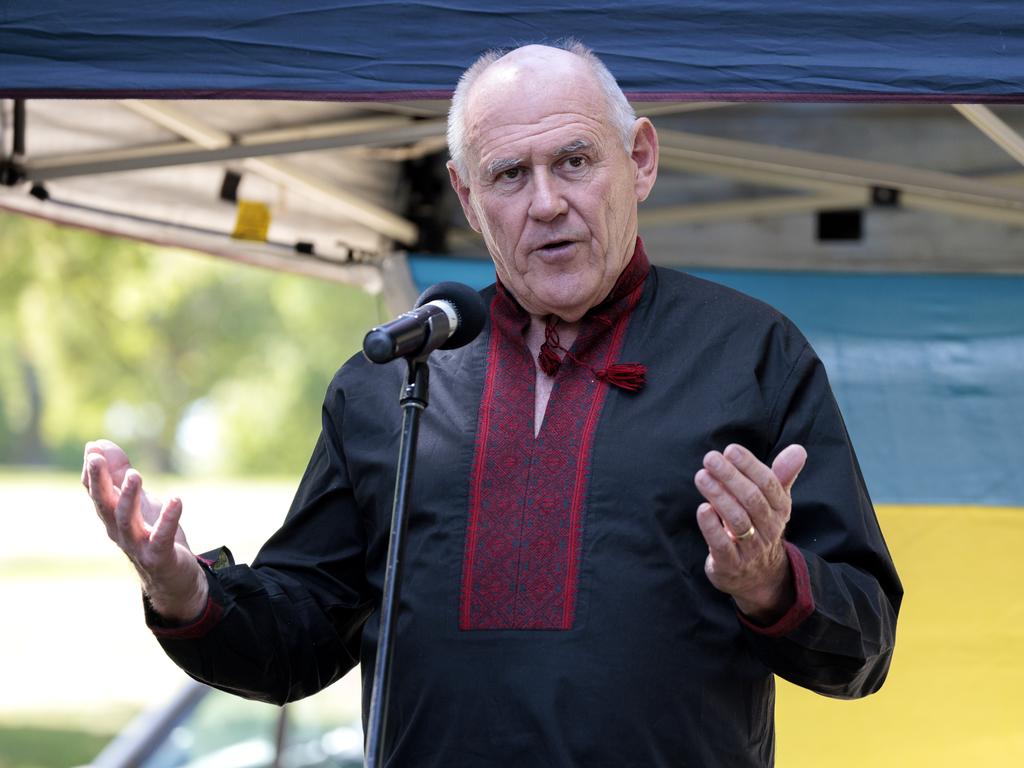Stefan Romaniw: Enemy of Putin’s Russia a devoted friend to all others
Stefan Romaniw’s leadership of Australia’s Ukrainian community was an example of what multiculturalism can achieve.

Stefan Romaniw understood when Russia invaded and annexed the Crimean peninsula in February-March 2014 that Vladimir Putin had greater ambitions; that Europe should fear him. Others saw the injustice of the attack – the first play in what is now the decade-long Russo-Ukrainian War. But few thought it would lead to a wider conflict.
Romaniw knew better that Putin wanted a new empire, the first stage of which was to deny Ukraine statehood and try to reclaim what he saw as historically Russian lands.
Weeks later, Malaysia Airlines Flight MH17 was shot down over eastern Ukraine, by a Buk surface-to-air missile of Russia’s 53rd Anti-Aircraft Missile Brigade. It had been transported into Ukraine that day, fired at the passenger jet – killing all 298 aboard, including 38 Australians – and returned to Russia shortly after.
Putin denied any involvement and among the many stories Russia issued to cover the crime even claimed the passengers were already dead. Then prime minister Tony Abbott knew who was to blame: “Australians were murdered. They were murdered by Russian-backed rebels using Russian supplied equipment.”
Romaniw saw it clearly: “Putin now has Australian blood on his hands. He has no respect for the international community, he does what he feels, he’s a power-monger.”
Romaniw wasn’t that long back from Kyiv where he took part in protests against then Ukrainian president Viktor Yanukovych after he rejected closer ties with Europe, naively preferring “a policy based on mutual interest and good relations with both Russia and the European Union”. The protests grew to rallies of hundreds of thousands, with police killing protesters. In February, 2014, parliament voted 328–0 to remove Yanukovych. I spoke to Romaniw that night. He was pleased but sensed it wasn’t resolved.
Romaniw was born to a Ukrainian father who met his German mother after the war. Her sister also married a Ukrainian and their son, Eugene Hawryszko, was Romaniw’s lifelong best mate – they called themselves brothers. Both families came to Australia in 1949 and moved into the same street in Tullamarine, decades before it had an international airport.
The families attended a local Ukrainian school where Romaniw – who, like his cousin, spoke German, Ukrainian and English – excelled. He went to Melbourne University and became a much loved schoolteacher, but always was deeply involved promoting the interests of the Ukrainian community, preserving their language – which had been banned in various ways, by Russians, since 1804 – and making sure Australians of Ukrainian heritage understood their debt to Australia and to their homeland.
Then Victorian premier Jeff Kennett introduced me to Romaniw in 1993, and he came in handy as we repatriated 111 Ukrainian children from Melbourne back to their homeland. The kids were mostly unwell and patients of the Kyiv children’s hospital. They had been sent here to get sunlight and fresh air, but their return tickets had been stolen and cashed out by a Russian “businessman”. Niki Lauda himself came out to fly the kids home on his airline
We then worked on two projects to stock the Kyiv hospital with medicines, radios, TVs and medical equipment. Its cupboards were literally bare and it ran only on the extraordinary efforts and goodwill of its nurses. None of it was possible without Romaniw’s contacts and drive. No one knows how he found the time: across those years he was chair of the Victorian Multicultural Commission and Multicultural Arts Victoria, and the state’s Australia Day committee, and was executive director of Community Languages Australia. His most demanding roles these past few decades had been as first vice-president of the Ukrainian World Congress and co-chair of the Australian Federation of Ukrainian Organisations. In these roles he travelled repeatedly to Ukraine to provide avenues for aid, particularly from Australia, including campaigning for the 120 Bushmaster armoured vehicles that were delivered last year. It distressed Romaniw that he was unable to secure the retired Taipan helicopters that were instead stripped of parts and will be buried.
He played a vital role in the historic address to the Australian parliament of Ukrainian President Volodymyr Zelensky on March 31, 2022. Few can forget the unprecedented standing ovation Zelensky received as his image flickered on to the screens. Then prime minister Scott Morrison later thanked Romaniw on the parliamentary record.
He was with Zelensky in recent weeks on the border of Lithuania, the country from which he was returning when he fell ill.
Romaniw was perhaps the best-connected Australian and worked the corridors on both sides of the House in Canberra and in all state parliaments seeking visas, aid and help for refugees while defending and promoting the interests of all Ukrainians.
Stefan Romaniw. Multicultural pioneer and community leader. Born Melbourne, November 12, 1955; died Warsaw, June 26, aged 68.





To join the conversation, please log in. Don't have an account? Register
Join the conversation, you are commenting as Logout